The Open Government Partnership (OGP) provides an opportunity for government and civil society reformers to make governments more transparent, participatory, and accountable. Working together, government and civil society co-create action plans with concrete commitments across a variety of sectors.
In December 2021, the United States government convened the first Summit for Democracy (S4D), which provided a platform for countries to announce commitments to protect and strengthen democracy at home and abroad. Here, we analyze these S4D commitments, their relevance to open government values, their areas of focus, and how they compare to OGP commitments.
This analysis is up to date as of 29 March 2022. Numbers may differ from other sources based on how commitments were broken down. See “About the Analysis” to learn more about the method.
Key Takeaways
- Open government is a strong component of S4D commitments. Roughly one-third of all S4D commitments are relevant to an open government value (transparency, civic participation, or public accountability). About 70 percent of this subset of commitments are related to civic participation (nearly half of which address civic space). In addition, 10 governments mentioned OGP in at least one commitment.
- S4D commitments show key gaps. First, many S4D commitments are vague. Around one-fifth of S4D commitments lack reference to specific, measurable activities, and 15 percent focus on past achievements rather than future goals. In contrast, 99 percent of recent OGP commitments include verifiable elements. In terms of regional gaps, few countries from Africa or Asia Pacific submitted S4D commitments. As for policy area coverage, S4D commitments do not address important topics like natural resource management, fiscal openness, and legislative openness. This points to the importance of the third takeaway below.
- OGP action plans are important vehicles for advancing S4D commitments. S4D commitments and OGP priorities align in several areas, such as civic space, anti-corruption, and inclusion of marginalized communities. Embedding these S4D commitments in OGP action plans would ensure that they benefit from the multi-stakeholder dialogue, peer exchange, independent monitoring, and support that is built into OGP. In addition, OGP co-creation processes can address some of the gaps in S4D commitments mentioned above.
By the Numbers
|
Featured Policy Areas and Approaches
Commitments submitted as part of the S4D cover a wide range of policy areas and sectors. The figure below shows the number of commitments made by OGP countries that relate to several areas of open government. The sections below explore the commitments related to each policy area in greater detail.
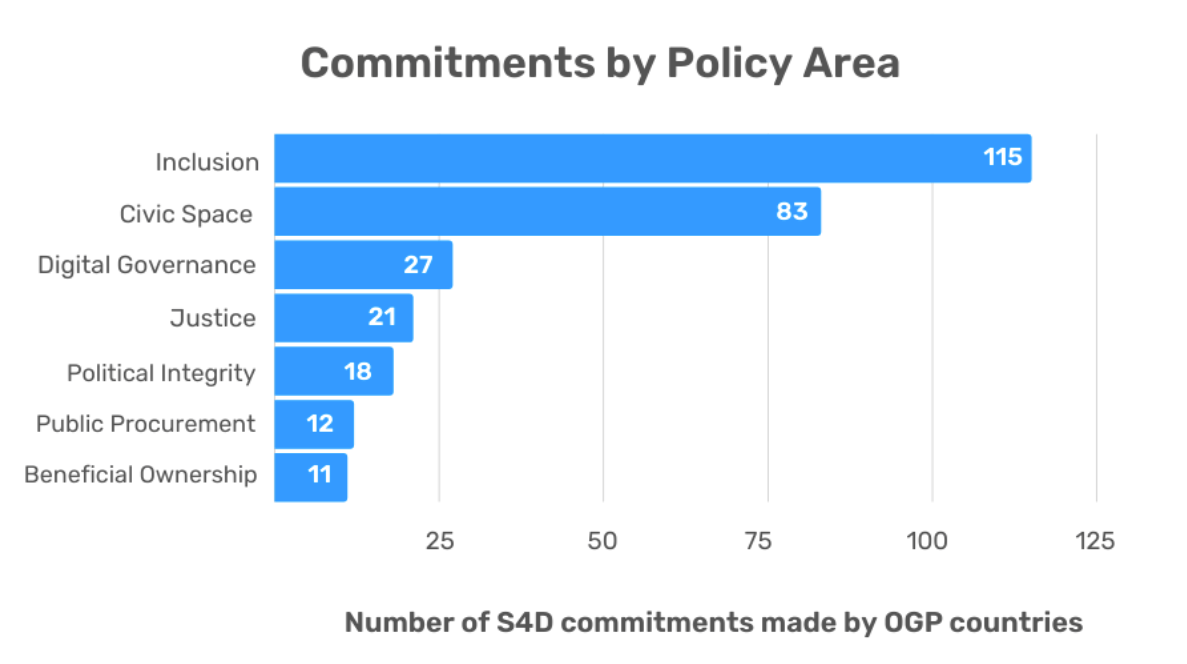

Beneficial Ownership Transparency
Disclosing beneficial owners—those who ultimately control or profit from a business—is essential for combating illicit financial flows and tax evasion. Nine OGP countries have made a total of 11 S4D commitments related to beneficial ownership transparency. Six of the nine countries have also advanced this area through OGP. However, beneficial ownership commitments in OGP action plans (made by 33 countries) have generally gone further than the S4D commitments, with more specific promises, including publishing central registers, standardizing data, and using ownership data in the licensing process for extractive industries. Moving forward, countries can use OGP action plans to co-create more ambitious and specific commitments on beneficial ownership transparency.
S4D commitment examples:
- Canada committed to implement a publicly accessible beneficial ownership registry by 2025, which has since been accelerated to 2023.
- Latvia committed to disclose the beneficial owners of joint-stock companies.
- The Slovak Republic committed to improve verification and control mechanisms for beneficial ownership data, building on their latest OGP commitment to fully implement the Beneficial Ownership Transparency Disclosure Principles
- The United States will require all companies receiving federal contracts worth more than $500,000 to publicly disclose their beneficial owner.
Other OGP countries with commitments: Germany, Italy, Malta, Montenegro, and Norway
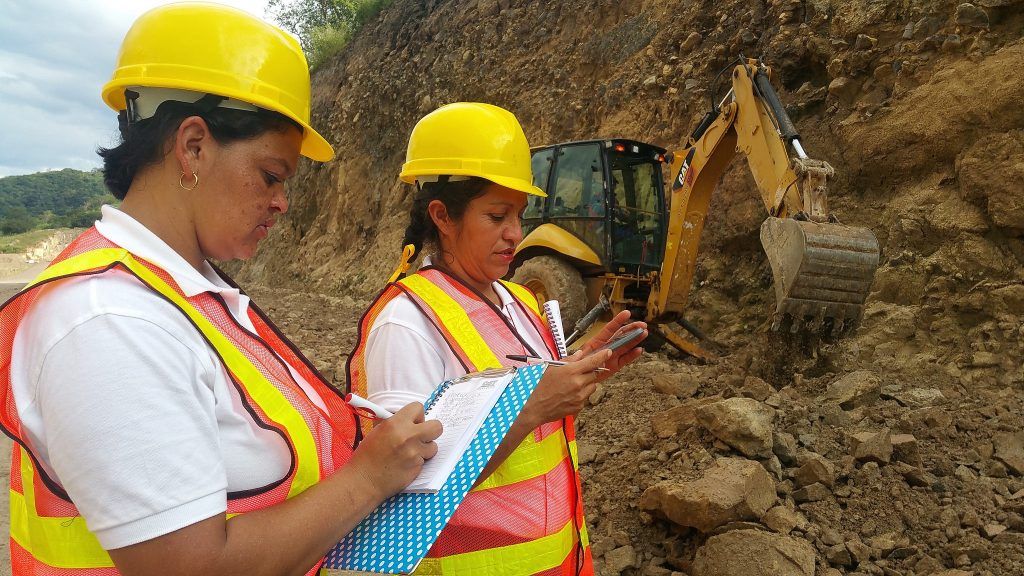
Public Procurement
Ensuring transparency in the procurement process increases competition, enables greater citizen monitoring, and ensures better value for money. Ten OGP countries have made 12 S4D commitments related to open public procurement. Most commitments are vague, with only three citing open contracting principles. This stands in contrast to procurement-related commitments in OGP, where 77 members have made a total of 249 commitments that have engaged citizens in monitoring, created open registries of contractors, and implemented the Open Contracting Data Standard (OCDS). Countries can use OGP action plans to design more ambitious commitments that advance specific open contracting principles.
S4D commitment examples:
- Italy committed to leverage its role as Co-Chair of the OGP Steering Committee to combat corruption, including by disclosing procurement information—planning, contractors, awards, and executions—for contracts and sub-contracts.
- Romania committed to make information on health-related contracts publicly available on the Health Ministry’s website.
- The United Kingdom committed to align contracting data with the OCDS, establish unique identifiers for all government contracts, and deploy a single user-friendly portal for UK public contracts.
Other OGP countries with commitments: Canada, Chile, Croatia, Mexico, Peru, Ukraine, and the United States
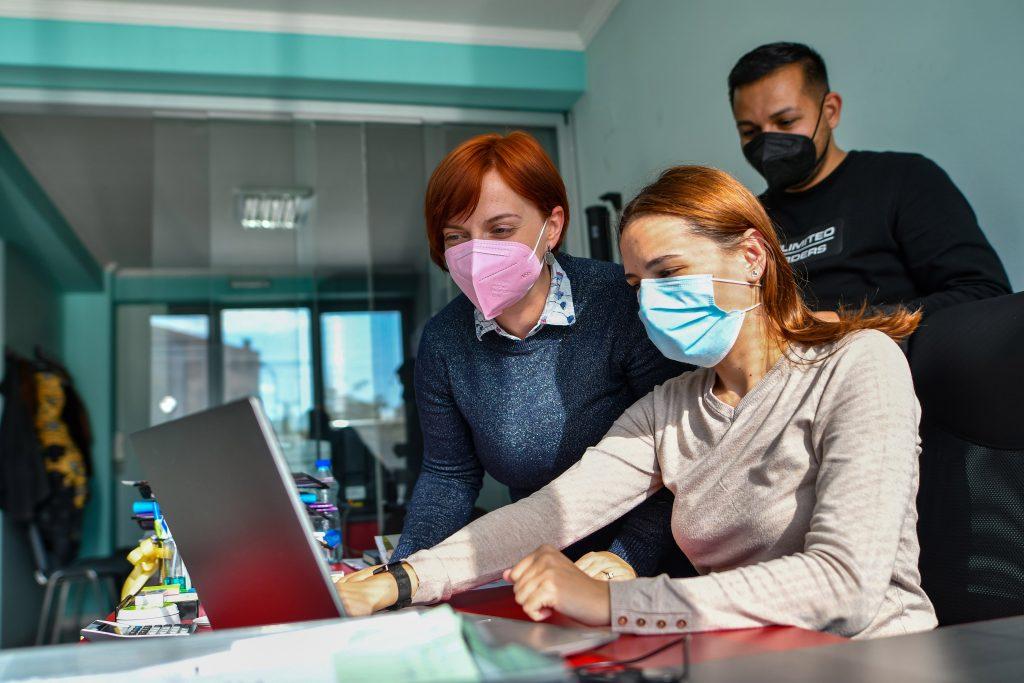
Justice
Investing in open and accessible justice institutions allows citizens to better defend their rights, demand access to public services, and protect their ability to participate in democratic processes. Thirteen OGP countries have made a total of 21 S4D justice-related commitments. Ten of these countries have also initiated justice reform through their OGP action plans. Access to justice—improving citizens’ ability to get justice and/or receive legal assistance—is the main focus among S4D justice-related commitments. OGP commitments on justice, on the other hand, tend to focus more on policing reforms and open justice—increasing transparency of justice institutions. This points to the opportunity for S4D and OGP processes to reinforce one another.
S4D commitment examples:
- Georgia will adopt legislation on the publication of judicial decisions, as well as ensure transparency in the appointment of judges to their First Instance and Appeal Courts.
- Malta committed to finalizing their first Digital Justice Strategy following the public consultation period. The Strategy has since been published and includes goals of improving access to justice through online services and increasing transparency of judicial statistics.
- Romania is committed to improving legal counsel for victims of domestic and gender-based violence and their affected children to ensure greater access to justice.
- The United States is re-establishing the Office for Access to Justice, as well as creating the White House Legal Aid Interagency Roundtable to expand legal aid and pro bono services.
Other OGP countries with commitments: Canada, Costa Rica, Croatia, Germany, Lithuania, Montenegro, Peru, Slovak Republic, and Ukraine
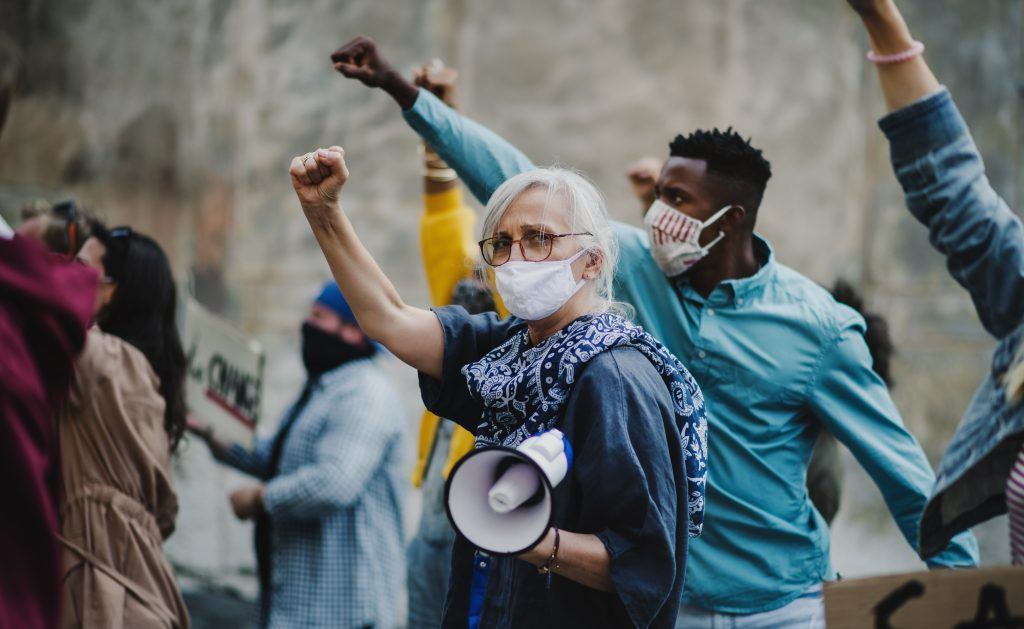
Civic Space
An open civic space—one that guarantees freedoms of expression, association, and assembly— allows citizens to actively engage with the government, hold decision-makers accountable, and is critical to the achievement of open government. Twenty-seven OGP countries have made 83 total S4D commitments related to civic space. Specifically, 22 of the 27 countries committed to increasing protection of journalists and the freedom of expression. Despite the popularity of civic space in S4D commitments, only two of these 27 countries are currently implementing civic space reforms through their OGP action plans. Embedding these S4D commitments into OGP action plans is essential to advancing their implementation and ensuring accountability.
S4D commitment examples:
- Malta plans to table an anti-SLAPP (strategic lawsuit against public participation) bill in hopes of protecting journalists from threats or intimidation.
- Peru committed to the protection of human rights activists against violence and discrimination, particularly environmental defenders and those defending vulnerable groups.
- Canada, Costa Rica, Czech Republic, Estonia, Norway, Sweden, and the United States each committed to increased financial and/or political support to the Lifeline Embattled CSO Assistance Fund, which provides emergency funds to civil society organizations in order to push back against threats to civic space.
Other OGP countries with commitments: Australia, Brazil, Croatia, Finland, Germany, Ireland, Italy, Latvia, Lithuania, Montenegro, Netherlands, New Zealand, North Macedonia, Portugal, Romania, Slovak Republic, Republic of Korea, and the United Kingdom

Digital Governance
New technologies with great potential to benefit society also come with unintended consequences that threaten democratic and open government. Countries are implementing measures of transparency and accountability to respond to these threats. Nineteen OGP countries have made a total of 27 S4D commitments related to digital governance. Ten of these countries have also used OGP as a vehicle for reform in this area, which is the second-fastest growing policy area in current OGP action plans. Most digital governance commitments in OGP action plans have focused on transparent use of government algorithms and artificial intelligence. S4D commitments, however, focus more on protecting civic freedoms online and combatting disinformation. Including these S4D commitments in OGP action plans is key to ensure that they benefit from dialogue with civil society and independent monitoring.
S4D commitment examples:
- The Slovak Republic committed to fight against disinformation and foreign interference, specifically through the regulation of generative adversarial networks used to make deepfakes.
- The United States plans to lead a broad stakeholder engagement process to create a Bill of Rights for an Automated Society that will clarify people’s rights and protections based on emerging technologies.
- Canada, Czech Republic, Estonia, Finland, Germany, Italy, Netherlands, Portugal, and Sweden pledged increased support and participation to the Freedom Online Coalition, a partnership of governments working with civil society and the private sector to protect civic freedoms and privacy rights online.
Other OGP countries with commitments: Australia, Brazil, Costa Rica, Latvia, Montenegro, Peru, Romania, and United Kingdom
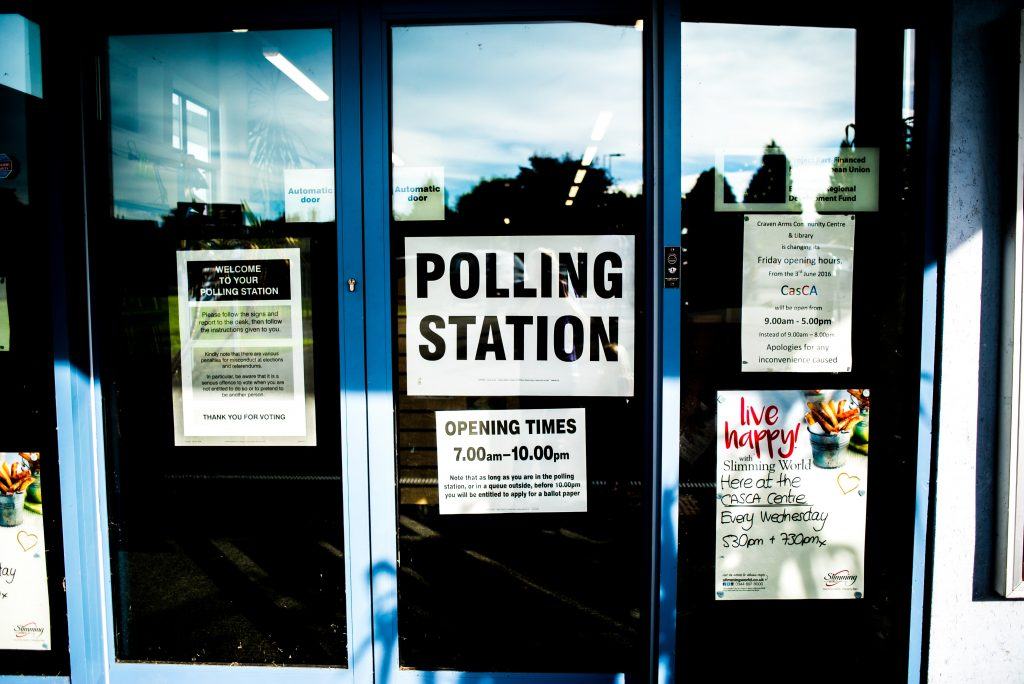
Political Integrity
Open government approaches are essential in removing illicit funds from politics, leveling the political playing field, and maintaining free and fair electoral competition. Fourteen OGP countries have made a total of 18 S4D commitments related to political integrity, which includes commitments on asset disclosure, conflicts of interest, elections and political finance, and lobbying. A majority of these S4D commitments are related to ensuring fair and transparent election processes. Only three of the 14 countries are currently implementing political integrity commitments through their OGP action plans. But political integrity reforms have been historically popular among OGP members, with 64 members making nearly 200 commitments in this area since 2011. Countries can build on these efforts and use OGP action plans to further advance political integrity reforms.
S4D commitment examples:
- Ireland plans to establish an independent Electoral Commission as part of electoral reform legislation, which will work to regulate online political advertising and modernize the electoral registration process.
- Liberia will prioritize the participation of women in electoral processes, along with ensuring transparency and accountability in electoral funding.
- Peru committed to increased financial transparency of electoral campaigns and political parties.
Other OGP countries with commitments: Australia, Brazil, Georgia, Germany, Moldova, Montenegro, Portugal, Slovak Republic, Republic of Korea, United Kingdom, and the United States
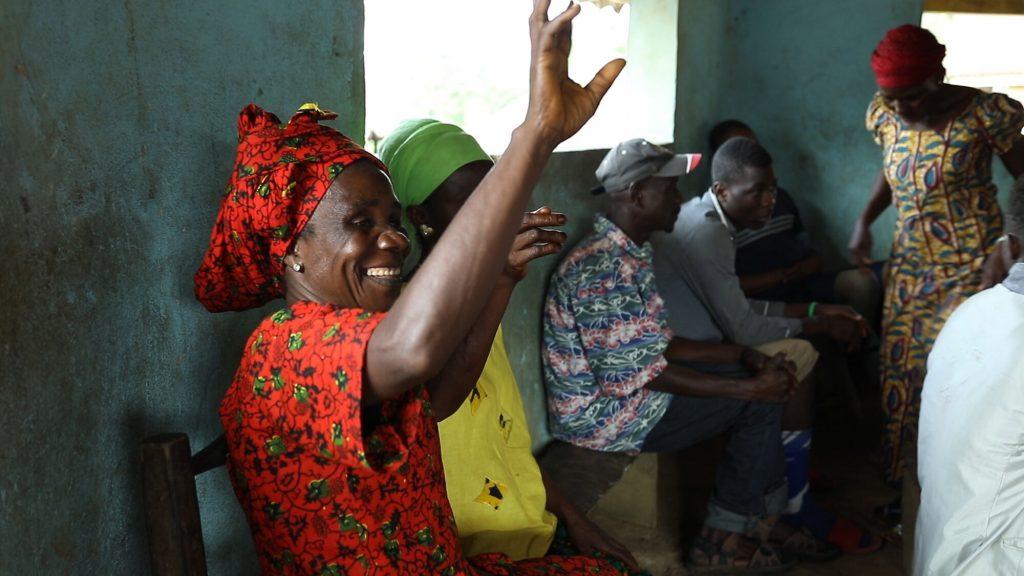
Inclusion
Inclusion is fundamental to the mission of open government. For governments to be truly open, they must serve all people – not just particular groups. Twenty-nine OGP countries have made a total of 115 S4D commitments that focus on marginalized communities. About a third of these (42) include clear elements of open government. They address issues such as women’s empowerment, inclusion of indigenous communities, and youth participation. Inclusion is also an important area of focus of OGP action plans, where more than three-quarters of OGP members are currently implementing a relevant commitment. Going forward, OGP countries would benefit from both embedding these S4D commitments in their action plans and engaging these marginalized communities through the OGP multi-stakeholder forums and processes.
S4D commitment examples:
- Canada committed to implement the UN Declaration on the Rights of Indigenous Peoples as well as to ensure that youth can influence government policy through organizations such as the Prime Minister’s Youth Council
- Italy is collaborating with civil society to develop a new National LGBTI Strategic Plan.
- Spain committed to establish a fund that promotes women’s effective participation in political life.
Other OGP countries with open-government-related commitments: Brazil, Chile, Costa Rica, Croatia, Denmark, Finland, Germany, Greece, Liberia, Montenegro, Paraguay, Peru, Romania, Slovak Republic, Sweden, United Kingdom, and the United States
OGP Support Unit staff entered all commitments published on the S4D’s Written Commitments webpage into data format.2 We followed each country’s own definition of a commitment, even if some were not future-facing or specific. Each commitment was then analyzed for its relevance to open government, verifiability, geographic scope, and timeframe.
Using a machine-learning algorithm, we also “tagged” each S4D commitment for policy areas and sectors addressed. We subsequently validated these policy area and sector tags for commitments that were both 1) made by OGP members and 2) relevant to open government values. Machine-generated tags on other commitments have not been verified but are included in the public database. Definitions for each tag are the same definitions used for categorizing OGP commitments and can be found under the “Definitions” tab. Please contact [email protected] with any questions or comments.
Country Sample
Most of the 55 governments that submitted S4D commitments are OGP members. The full list of the 39 OGP countries that submitted written S4D commitments is available below, along with links to their submissions.0 Most are from Europe, with few OGP countries from Africa or Asia Pacific.
| Africa | Americas | Asia-Pacific | Europe |
| Kenya Liberia |
Brazil Canada Chile Costa Rica Mexico Paraguay Peru United States (International, Domestic) |
Australia Georgia Republic of Korea New Zealand |
Albania Croatia Czech Republic Denmark Estonia Finland Germany Greece Ireland Italy Latvia Lithuania Malta Moldova Montenegro Netherlands North Macedonia Norway Portugal Romania Slovak Republic Spain Sweden Ukraine United Kingdom |
0 The three commitments made by the Dominican Republic are not on the State Department website but can be found in our commitment database.
1 These numbers exclude commitments from the Dominican Republic that were shared with OGP directly. See “About the Analysis” for details.
2 The database includes three commitments from the Dominican Republic that were shared directly with the OGP Support Unit.
